10 Best Online Therapy Services of 2024: Invest in Your Mental Health
Online therapy services offer a practical and innovative approach to mental health. In reality, in-person therapy has limited flexibility, accessibility, and cost. More importantly, in-person sessions have become more difficult due to quarantines and social distancing measures. These changes have led to a surge in the use of online healthcare in recent years, and studies show that this boom will continue.
As online therapy, also known as “e-therapy” or “internet therapy,” expands, so does the number of available providers. When looking for a virtual therapy service that is a good fit for your needs, you should consider factors such as price, communication methods, and therapist experience. The Best Online Therapy Services for Therapists in 2024

- BetterHelp: The Best Online Therapy Site Overall
- Muscle: The Best with an Affordable Monthly Price
- Online-Therapy.com. Best Online Cognitive Behavioral Therapy
- Thriveworks: Best for Insurance-Covered Treatments
- ReGain: Best for Online Couples Therapy
- Pride Counseling: Best Online Therapy for LGBTQ+ People
- Talkspace: Best for Unlimited Messaging and Flexible Payment Plans
- Calmerry: Best for a Wide Range of Therapy Types
- Amwell: Best for Ease of Access
- Faithful Counseling: Best for Faithful Christian Counselors
Our Methodology: How We Evaluate the Best Online Therapy Services
Our Methodology: How We Reviewed the Best Online Therapy Services
To find the best e-therapy options, we compared several vital factors, s including:
- Price, availability, and plans (weekly vs. monthly, total cost)
- Communication methods (texting, voice calls (video calls))
- Number of therapists available and their specializations (anxiety, depression, addictions)
- Credentials and hiring requirements (PsyD, Ph.D., LCSW, LPS)
Types of therapy offered (CBT, psychoanalysis)
Our Top 10 Best Online Therapy Services
BetterHelp is one of the largest providers of online therapy services, allowing you to find a licensed professional therapist in less than 24 hours. You can connect with your therapist via phone, video call, live chat, or text message.
Although the platform doesn’t accept health insurance, it does offer financial assistance to patients on a limited budget.
Why we chose BetterHelp: The BetterHelp app and online service are easy to use and give you access to self-help worksheets on a variety of topics, including cognitive behavioral therapy (CBT) and conflict resolution.
Our experience: BetterHelp reviews are positive, and the service is affordable. We like that BetterHelp counselors have a rigorous vetting process.
PROS
- Message your therapist at any time.
- Studies show the platform is effective.
- It operates in over 200 countries and 82 languages.
CONS
- Therapists cannot prescribe medication to professionals. Therapists.
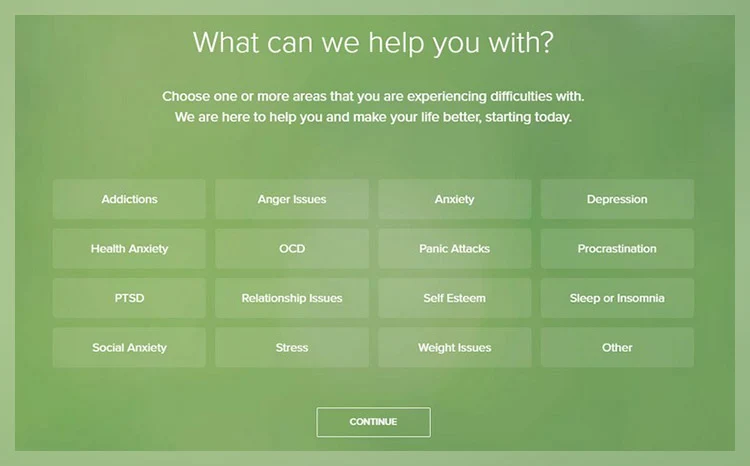
Cerebral offers online talk therapy sessions for people suffering from disorders such as anxiety, depression, and insomnia. Its professional counselors offer a comprehensive treatment plan tailored to your needs. Cerebral’s two-tiered app, Cerebral TalkTalk, helps you manage your symptoms and achieve a more balanced lifestyle.
Why we chose Cerebral: Cerebral is one of the most affordable options on our list while still offering high-quality care.
Our experience: We like that Cerebral’s team checks in with you monthly, monitors your reactions to your medication, and helps you make any necessary adjustments to ensure your treatment is going as planned.
PROS
- Very affordable pricing plans.
- A team of healthcare professionals for a comprehensive approach.
- Online sessions and home delivery of medication.
CONS
Not all plans are available nationwide, and they don’t cover all mental health issues.
- Online-Therapy.com has a network of counselors from a variety of fields, primarily in the C.G.B. Additionally, its platform offers a variety of interactive worksheets, activities, and self-help tasks to guide you through your program.
Depending on your preferences, you can communicate with your counselor via text, audio, or video calls.
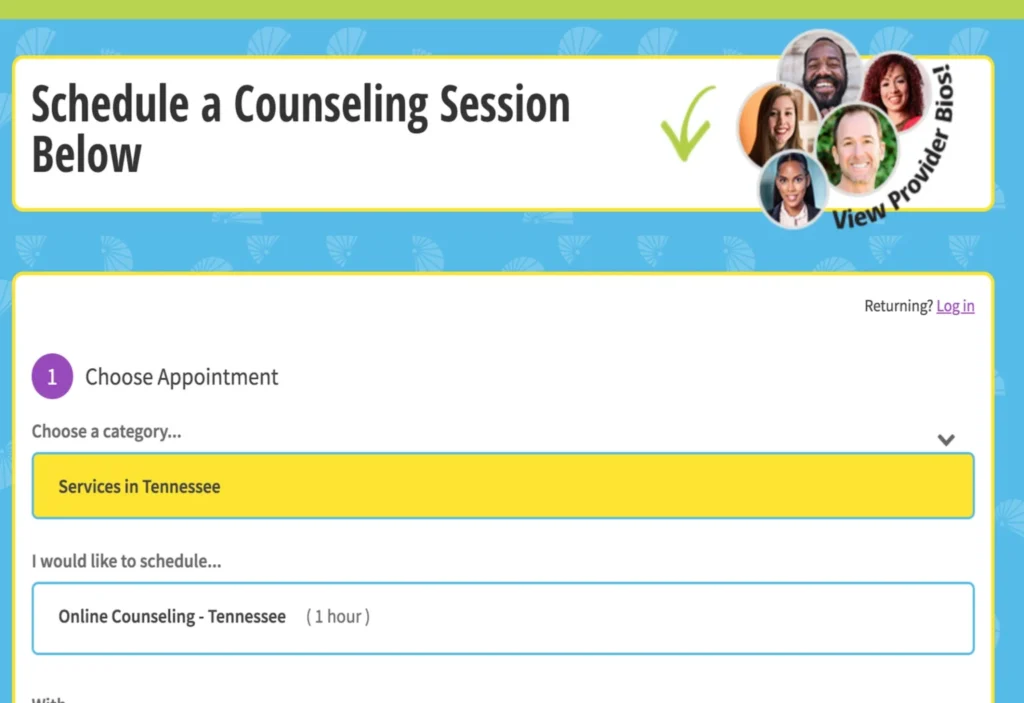
Why we chose Online-Therapy.com: This online therapy provider allows you to change therapists at any time during your treatment. Its registration tool is another helpful way to track your efforts and improve your well-being.
Our experience: Unlike other online therapy services, Online-Therapy.com allows you to view the profiles of recommended therapists and choose your counselor based on user reviews, specializations, and credentials.
PROS
- Affordable compared to other providers
- Choose your therapist and change them whenever you want
- Easy-to-follow health exercises
CONS
- The most basic plan does not include live sessions
- Therapists on the platform cannot prescribe medications

Thriveworks services include in-person and phone therapy sessions. Its network of therapists has expertise in a variety of specialties, including individual talk therapy, psychotherapy, couples/family therapy, child therapy, and more.
Why did we choose Thriveworks? is in-network with most health insurance plans, so you only have to pay a co-pay for therapy sessions. Even if your health insurance doesn’t cover it, Thriveworks is still affordable.
Our experience: Thriveworks stands out from other online therapy services by offering same-day or next-day appointments and minimizing wait times. You can also connect with your therapist between sessions if needed.
PROS
- Generally accepts health insurance from major providers.
- Online or in-person at over 300 locations.
CONS
- No connection to massage therapists.
- Some services have location restrictions.
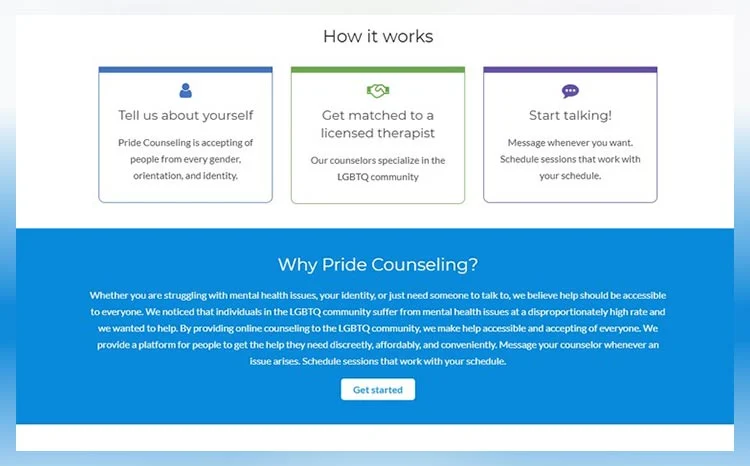
ReGain offers convenient online couples therapy for couples and individuals. Its service connects you with a certified therapist who has been specifically selected to meet your needs and goals. Your monthly subscription gives you one live video or phone session per week and 24/7 access to an online therapist.
We chose ReGainReGain understands each individual’s situation and offers discounted rates for those with financial difficulties or disabilities.
Our experience: With ReGain, you can choose your therapy sessions to fit your schedule. This makes it an especially convenient option if you’re short on time.
PROS
- Therapists specialize in a wide range of relationship issues.
- Easy-to-use app. Discounts are available for those who need them.
CONS
- Not a great choice.
- Doesn’t work with insurance companies.

Pride Counseling offers affordable online therapy for members of the LGBTQ+ community.
Pride Counseling charges per week, rather than per session, allowing for multiple sessions in the same week. It also has a mobile app that gives you access to all the features of the website, with the added benefit of mobile mental health support.
Pride Counseling does not offer family therapy or support groups, which may be helpful for LGBTQ+ individuals. They also do not work with insurance companies, although their low weekly therapy rates make them more affordable than traditional in-person therapy. We use Pride Counseling. The main advantage of Pride Counseling is that it offers a safe and supportive environment for members of the LGBTQ+ community to work through their mental health issues. All therapists are specifically trained to meet the needs of this community.
Ourexcommunity’sridee counseling prioritizes discretion, allowing you to register under a pseudonym, while other services often require your full legal name.
PROS
- All therapists specialize in LGBTQ+ counseling
- Android and iOS app
- Payment is weekly, not per session
CONS
- No support group options
- Health insurance not accepted
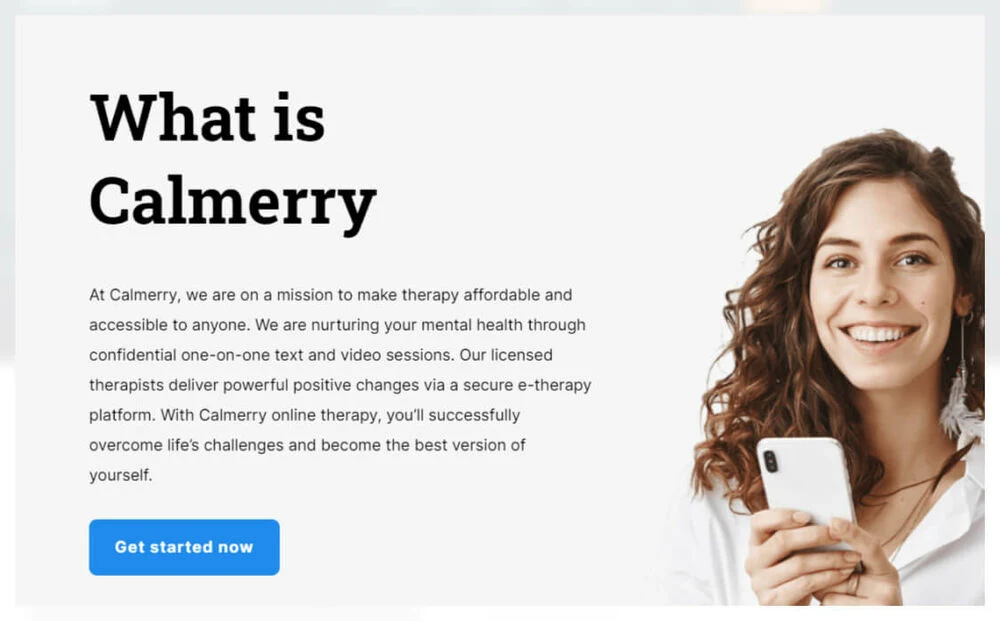
Talkspace is an online therapy platform that offers psychotherapy counseling and treatment for teens, adults, and couples. They use a detailed matching process to connect you with a licensed, experienced therapist based on your circumstances.
They accept insurance and offer three weekly payment plans. The first two plans include live sessions, but only the highest plan includes text therapy with guaranteed daily answers to any questions.
Why we chose Talkspace: Talkspace specializes in over 40 areas of clinical therapy, so you can be sure your needs will be met.
Our experience: We were impressed with the responsiveness of Talkspace’s therapists and counselors. When you need help, their healthcare professionals are ready to support you.
PROS
- Over 40 clinical approaches and treatments
- Suitable for adults, teens, and couples
- Offers prescriptions through its psychotherapy services
CONS
- Requires internet connection
- Live sessions only available on higher-priced plans
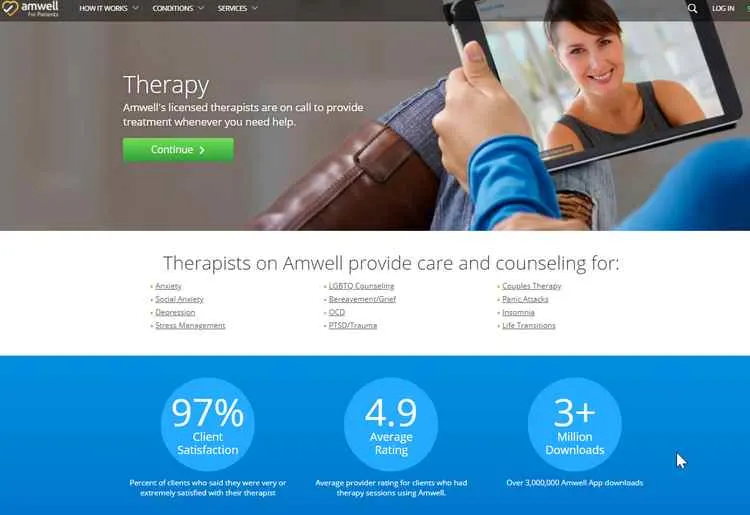
Calmerry is a virtual therapy network whose therapists are trained in a variety of specialties, including grief therapy, couples therapy, and LGBTQ+ therapy. They offer two ways to connect with therapists: messaging and video conferencing.
All plans include the ability to send messages at any time, daily responses from therapists, and the ability to change therapists or cancel at any time.
Why we chose Calmerry: Calmerry conducts thorough background checks on its therapists to ensure the quality and reliability of the therapy services you receive.
Our experience: The blog “Calmerrydoesn’tmatchyourn’tthetherapistrrr” provides information on therapeutic methods (including CBT, Emotionally Focused Therapy, and Dialectical Behavior Therapy) so you can find the approach that best suits your needs.
PROS
- A convenient app for therapy anywhere
- A comprehensive blog on therapy and mental health
- Easily accessible mental health counselors
CONSDoesn’tt accept insuranceDoesn’tnablee privacy protection

Amwell offers flexible online therapy with a network of over 350 professional counselors who specialize in a variety of therapeutic methods. Their platform is accessible via their website or mobile app and doesn’t require you to do so; instead, they allow you to conveniently pay per session.
You can search for available therapists using the platform’s filters and easily schedule an appointment when you find the right one. This means you can connect between sessions. the advantage is that you spend less time waiting for the help you need.
Why we chose Amwell: Amwell is a one-stop solution for all your healthcare needs, including but not limited to therapeutic services. Their specialists can even prescribe medication if needed. Additionally, Amwell is connected to 125 insurers, which can help reduce your out-of-pocket costs.
Our experience: Unlike most online therapists, when you use Amwell, you don’t have to wait for an appointment to see a therapist. The search process gives you more autonomy, providing you with the relevant information you need to choose the right therapist.
PROS
- Choose a therapist and schedule an appointment right away.
- Covered by most insurers.
- Get a prescription without visiting a doctor.
CONS
- Serves physicians but does not operate in the United States.
- No communication between scheduled appointments.
Faithful Counseling is an online platform that specializes in clinics and therapy that incorporates Christian teachings from the Bible. All therapists are board certified in their field and provide statements of their beliefs to ensure they align with Faithful Counseling’s statement of beliefs.
The provider uses a sophisticated matching process to connect you with a therapist who specializes in both your mental health issues and your Christian faith. Faithful Counseling is a great platform if your faith is central and you want to incorporate biblical teachings into your treatment. The simple sign-up process, simple and engaging interface, and easy-to-use appointment booking feature make it easy for Christians looking for faith-based counseling to try Faithful Counseling.
Why did we choose Faithful Counseling?
PROS
- Over 6,000 therapists specializing in Christian counseling messaging services
- Available via website or free app
CONS
- Matching process can take 1 to 2 days
- Can’t choose a specific therapist
How to Compare the Best Online Therapy Services
Quality of service, therapist qualifications, cost of care, and communication methods are important factors to consider when comparing the best online mental health services. We’ve compiled this table to see how our top 10 online therapy platforms differ in terms of overall user reviews, affordability, and how you can communicate with your therapist.
For example, if you prefer to communicate with your licensed therapist over the phone, you should check if this method is available for a particular online therapy service.
Our Methodology: How We Reviewed the Best Online Therapy Services & Sites
To find the best online therapy options, we compared several important factors, including:
- Price, availability, and plans (weekly vs. monthly, total cost)
- Communication methods (texting, voice calls, video calls)
- Number of therapists available and their specializations (anxiety, depression, addiction)
- Credentials and hiring requirements (psychotherapy, PhD, social psychologist, psychodynamic therapy)
- Types of therapy offered (cognitive behavioral therapy, psychoanalysis)
What Is Online Therapy and What Makes It a Viable Alternative to In-Person Therapy?
Online therapy is a virtual version of traditional in-person psychotherapy. Online therapists use the same interventions as in-person therapists, including CBT, dialectical behavioral therapy (DBT), trauma therapy, and talk therapy.
According to a 2022 meta-analysis of depression research and treatment by social worker Carly M. Charon and epidemiologist Kevin M. Gorey, online therapy programs, particularly those that involve video calls, may be as effective as in-person treatment.
Online therapy is also a more affordable option for those who can’t afford traditional psychotherapy, have difficulty getting to meetings, or are concerned about the stereotypes they see when they walk into a therapist’s office. The Psychology of a Psychotherapist: How Online Therapy Works.
To get started, you answer a few demographic questions, indicate the mental health issue you’re seeking help with, take a screening test for depression and suicidality, and indicate the characteristics you’re looking for in a therapist.
Depending on the platform, this data is analyzed by an algorithm or a real person. We then match you with an online therapist who is tailored to your preferences and is trained to treat your specific mental health concerns.
From there, the online therapy program process unfolds as if it were an in-person meeting. Meet with a therapist for 45-55 minutes each week to discuss your personal struggles, better understand their origins and impact on your life, and find practical tools to address them.
These tools may include emotional regulation techniques, communication skills, and strategies for identifying and changing problematic thoughts and behaviors.
Phone, Video, or Chat: Choosing the Best Format for Online Therapy
A 2020 sociological study conducted by John O. Hietanen of Psychiatry found that eye contact during video calls elicits physiological arousal comparable to in-person interactions. Adjusting to the therapist’s body language and facial expressions, making eye contact, and allowing them to do the same can be more engaging for both of you.
However, some clients may prefer phone or text messaging due to concerns such as poor internet connectivity, schedules that prevent them from appearing in front of a camera, or simply because these options may be more affordable.
According to a 2022 Current Psychiatry Reports study led by Patricia W. Chen, phone therapy is effective for treating a wide range of mental health disorders, so rest assured that this option is also viable.
Additionally, a 2022 Frontiers in Psychiatry review led by Reham Shalabi concluded that chat support is beneficial for people with addictions and psychological disorders and can reduce symptoms of anxiety and depression.
Benefits of Online Therapy: Why Choose This Approach?
Online therapy is convenient, flexible, and more affordable than in-person therapy, especially with a subscription. Travel is not required, so those who are away from home or have limited mobility can meet with a pheromone therapist. This makes it much more viable than in-person therapy for those looking for better health options.
With online therapy, people don’t have to worry about going to therapists, which reduces the potential perception of stigma.
Who Can Benefit from Online Therapy?
Online therapy is ideal and can significantly benefit those who:
- Have mild to moderate symptoms. Patients with anxiety, depression, stress, and relationship difficulties are equally suited to virtual therapy.
- Let’s say you have a busy lifestyle or live far from in-person therapy options. In that case, online therapy allows for remote and mobile support, which is helpful if you don’t have the time to dedicate to it.
- Online therapy, which is typically more affordable than in-person therapy, is not covered by insurance, making it more accessible even for those without health insurance.
- Take advantage of additional communication options. Virtual therapy platforms can offer messaging, phone calls, and educational modules in addition to… therapy sessions.
- Are ready and willing to participate in therapy. A key to reaping the benefits of online and in-person therapy is willingness to participate, which, according to a 2017 BMC Psychiatry study by psychologist Henning Kramp, predicts better treatment outcomes.
Considerations for Online Therapy: Who May Not Benefit?
Online therapy may not be helpful for those who:
- Are experiencing an acute mental health crisis or have severe symptoms. Patients with extreme symptoms of psychosis, anorexia, bulimia, or mood disorders are not suitable candidates for online talk therapy. These conditions often require higher levels of care, such as hospitalization or intensive outpatient programs, which online therapy does not offer.
- Do I need a court order for mental health services? People with a court order for treatment may not be eligible for online therapy because therapists must complete paperwork that online platforms cannot process.
- They prefer in-pertson contac. Online therapy sessions are not designed for in-person meetings, so they may… Not as helpful for those who prefer to meet with their therapist in person.
How Much Does Online Therapy Cost?
Online therapy can range from $60 to $200 per session. This depends on the platform, subscription plan, and type of therapy you choose. Some services include medication management or psychotherapy in their plans, which can affect the overall cost. The final price can also be affected by whether you meet with a professional via video conference, phone, or chat.
Many online platforms, such as Thriveworks, Cerebral, Talkspace, and Amwell, also accept insurance to help cover the cost.
Free Online Therapy Services: Availability and Limitations
While it can be difficult to find free online therapy services, several online mental health support services offer emergency help.
These include crisis lines with text and chat capabilities, such as the National Suicide Prevention Lifeline’s chat and text service. The National Alliance on Mental Illness (NAMI) also offers free online support groups.
Saving with Online Therapy: Financial Benefits to Consider
A 2022 survey by Zencare found that the average cost of therapy in the U.S. is $182 per session, with statistically higher rates of at least $728, which doesn’t take into account additional expenses or potential loss of income due to time spent in the session or traveling.
In contrast, most virtual therapy sessions offered through affordable online therapy platforms cost less than $100 and are billed weekly or monthly, depending on the user’s subscription plan. The small fee typically includes additional features like worksheets, educational content, and unlimited messaging with the therapist, which are often not included in in-person therapy.
Unlimited Sessions and Flexible Communication Options
Unlike in-person therapy, which limits therapeutic interactions to face-to-face formats, online therapy platforms allow clients to see and speak with their therapists through video conferencing software, phone calls, messaging, and chat features. The platforms also allow for unlimited messaging outside of regular therapist sessions.
Reduced Commuting Costs and Time
According to AAA.com, the average price of gasoline in the United States remains above $3.40, which means that driving to a therapist’s office increases the actual monthly cost of in-person therapy, along with tolls and parking fees.
Choosing the Right Online Therapy Service in 2023
To get the best results from virtual therapy and achieve better health, it’s important to find online therapy services. Consider the following key factors to help you decide which option is best for you.
- Services Offered: Choose platforms that interest you, such as CBT, DBT, Mindfulness-Based Stress Reduction (MBSR), or faith-based therapies such as Christian counseling, couples therapy, or affirmation therapy. Also, consider whether you need a professional who can prescribe medication.
- Features: Carefully research the platform’s additional features to best suit your personalized therapy needs. In addition to therapy, there are other resources available, such as courses, digital worksheets, and mood and progress monitors. For example, Calmerry offers helpful follow-up tools, and Online-Therapy.com offers yoga classes.
- Cost: Consider how much you’re willing to pay for your mental health care, as not all online therapy platforms are priced the same. For example, Online-Therapy.com offers services for less than $40 per week. In contrast, medication and therapy services from companies like Cerebral, Amwell, Thriveworks, and Talkspace range from $99 to more than $200 per month if you don’t have health insurance.
- Ease of Use: The usability of online therapy platforms and mental health apps influences their relevance, as researcher Amy Hai Young Chan found in a 2021 review published in the Journal of Psychiatry and Mental Health Nursing. Finding the Right Therapist for You
It’s important to understand what each type of therapist’s certification means to know how they can help you.
Finding the Right Therapist for You
Psychiatrist (MD)
A psychiatrist has a medical degree, hence the term “MD.” This means they are knowledgeable about biological systems and incorporate knowledge of the biochemistry of the brain and body into their therapy sessions. Psychiatrists are the only therapists on this list who can prescribe medication.
Psychologists (PsyD, PhDPsychologistsst hold a doctoral degree between four and rigorous years of post-secondary education. ssysreceive extensive training in clinical work with clients, while PhDs participate in research during their post-secondary education.
Licensed Professional Counselor (LPC)
LPCs complete two-year master’s programs in mental health counseling and psychotherapy. They specialize in psychological testing and diagnosis and are likely to have completed postgraduate training in psychotherapy techniques such as CBT, DBT, and Acceptance and Commitment Therapy (ACT).
Licensed Marriage and Family Therapist (LMFT)
LMFTs complete two-year master’s programs with a focus on marriage and family therapy. They specialize in helping individuals, couples, and families with interpersonal or relationship difficulties. They complete additional post-graduate training to work with specific demographics and conditions.
Licensed Clinical Social Worker (LCSW)
To obtain a clinical license, social workers must complete a two-year master’s degree program, demonstrate three years of supervised client work, and pass a four-hour licensing exam.
Social workers are trained in a strengths-based approach, which means they assess their clients’ innate abilities and capacities rather than focusing solely on disorders or diagnoses. They are ethically bound because they serve vulnerable and oppressed populations. They are also experienced. Their approach is “as if” “would be,” meaning they view symptoms in light of the environment (family, institutional, political) in which clients live, work, and interact.
Standard Treatment Fields in Online Therapy
Many therapists offer a variety of methods, such as CBT, DBT, MBSR, and ACT, to name a few. Here are some treatment options that are closer to getting you on the path to wellness.
Couples Counseling
Online couples therapy focuses on couples who are facing challenges such as communication, infidelity, potential separation, conflict, sexual dissatisfaction, financial difficulties, alienation, or simply difficulty adjusting to major life events such as parenthood, infertility, or the loss of a child.
An online couples therapist helps both partners better understand the mother and father’s perspective and healthy communication, and supports the use of coping skills that can help rebuild the relationship.
Teen Therapy
Adolescent therapy addresses the concerns and challenges of navigating the complex period between puberty and young adulthood.
Adolescent therapy can sometimes include play therapy, where teens engage in games or activities that help them form stronger bonds with their therapist and more easily express their true thoughts and feelings.
LGBTQ+ Support
Online LGBTQ+ therapy aims to affirm and accept the sexual orientation of non-heterosexual individuals while taking into account their concerns, stressors, and unique needs.
Anxiety Treatment
Online anxiety therapy focuses on the thought processes that lead to anxious feelings and behaviors, and supports individuals in practicing emotion regulation and mindfulness techniques that help reduce anxiety.
Depression Therapy
Online depression therapy and counseling help patients identify and challenge distracting beliefs and thoughts: “I…”, “I…”, “I…”, “I…”, “I am a rebel” and “I…”.
Bipolar Disord”r Manage” ent
Effective online therapy for patients with bipolar disorder includes studying the onset and progression of symptoms, educating patients about the illness and teaching them emotional regulation skills.
Online therapists who treat bipolar disorder help patients identify and develop safety plans by anticipating the first signs of mania, hypomania or depression flare-ups. Treatment for Obsessive-Compulsive Disorder (OCD)
Online therapy for OCD typically involves CBT and exposure therapy, which gradually increases exposure to real or imagined OCD stimuli while employing tolerance-enhancing practices such as deep breathing and breathing visualization.
ACT, which seeks to increase cognitive flexibility and the pursuit of value-oriented behavior, has also been shown to improve outcomes of standard OCD treatments.
5 Tips for Preparing for an Online Therapy Session: Maximize the benefits of your online therapy sessions and work to better health for your mental well-being. You should know how to prepare for them. Eepthese tips in mind:
1Minimizeze Environmental Distractions
Distractions disrupt the therapeutic process and can interfere with your ability to learn new skills and make important connections between past experiences and current behaviors.
2. havea Backup Internet Connection Plan
Poor video quality, frozen images, or internet outages can disrupt and disrupt the quality of the therapy you receive.
3. e Present and Engaged During Sessions
It may be more convenient to conduct virtual therapy from home or work, allowing you to perform tasks such as checking email, folding laundry, washing dishes, etc.
4. rrepairTalking Points or Discussion Topics
Please note down situations that require support in processing between therapy sessions so that you can explore them in more depth once the session begins. Logging in from home or not having to sit in a waiting room and concentrate may not remind you of important challenges from your week. However, writing them down in a notebook or on a device keeps us accountable and gives the online therapist more opportunities and time to help us where we need it most.
PTSD
A 2007 study in BMC Psychiatry, led by researcher Kristin Nevelsrud, found that patients with PTSD experienced significant improvement in their symptoms after working with a qualified virtual therapist.
Insomnia
Danish researchers, led by psychologist O’Toole, evaluated cognitive behavioral therapy (CBT-I) for insomnia for its effectiveness in improving sleep quality and total sleep duration.
Borderline Personality Disorder
A 2021 JMIR mental health review, led by psychologist Margo Rivera, found that online therapy that included CBT skills training and education improved self-regulation in patients with borderline personality disorder and reduced the frequency of their fighting or arguing with others.
Burnout
Researcher Jung-Hyun Park and colleagues found in their 2022 systematic review that online interventions that promote emotional freedom techniques (EFT) reduced symptoms of fatigue in nursing staff. Eating disorders
Additional Online Therapy Sites Revyou’reIf you’re looking oyouyou’sdyouyou’sd our total reviews here:
- JustAnswer. Ideal for those who aren’t ready for proper therapy. Ideal for people with health insurance who struggle with anxiety and depression.
- PrestoExperts. Ideal for paying a therapist by the minute, not by the month.
Explore These Interesting Articles on Online Therapy
- How much does online therapy cost?
- New to Here’sy Online. Here’s How. A better way to fill your mental health prescriptions.
Online Therapy in 2023: A Worthwhile Investment
Virtual therapy companies offer affordable alternatives to in-person therapy, with comparable quality of care and results. Several online therapy services even accept health insurance, further reducing costs.
The options for online therapy may seem limitless, but what is most important to you?




